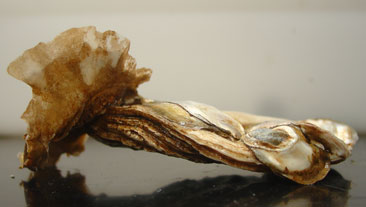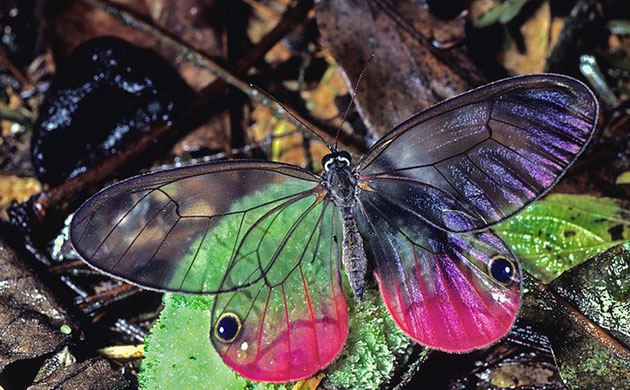TOP STORIES  Chesapeake Bay Becoming More Acidic, Impacting Oyster Shell Growth
Chesapeake Bay Becoming More Acidic, Impacting Oyster Shell Growth
Acidity is increasing in some regions of the Chesapeake Bay even faster than is occurring in the open ocean, where it is now recognized that increased levels of atmospheric carbon dioxide dissolve in the seawater thereby making it more acidic.
These more acidic conditions in key parts of Chesapeake Bay reduce rates of juvenile oyster shell formation, according to new research published in the journal Estuaries and Coasts.
The study, conducted at the University of Maryland Center for Environmental Science, examined 23 years of water quality data and concluded that significant trends in acidity will have mixed impacts on juvenile oyster growth, with some areas becoming more acidic and others more alkaline.
10 June 2010
Photo courtesy of Horn Point Laboratory
 UN's 'IPCC for nature' to fight back against destruction of natural world
UN's 'IPCC for nature' to fight back against destruction of natural world. . . With growing concern about the human impacts of destruction of habitats and species from around the world, from riots over food shortages and high prices, to worsening floods, and global climate change, more than 80 governments voted to take action in the final hours of a week-long conference in Busan, South Korea.
The Intergovernmental Science Policy Platform on Biodiversity and Ecosystem Services (IPBES), also dubbed "the IPCC for nature", will be modelled on the Intergovernmental Panel for Climate Change, which has been credited with driving global warming and climate change from a fringe scientific issue to mainstream public and political concern.
. . . "IPBES represents a major breakthrough in terms of organising a global response to the loss of living organisms and forests, freshwaters, coral reefs and other ecosystems that generate multi-trillion dollar services that underpin all life – including economic life – on Earth."
11 June 2010
J Jowit
Photo credit: K Gilbert/AP
 So Far, Fish Appear to Be Healthy After Tennessee Fly Ash Spill
So Far, Fish Appear to Be Healthy After Tennessee Fly Ash SpillFish exposed to fly ash at the site of the Tennessee Valley Authority coal ash spill are faring better than some expected, researchers have learned.
Oak Ridge National Laboratory in collaboration with TVA has found that while small amounts of some contaminants from the December 2008 fly ash spill have been taken up by fish in the Clinch and Emory rivers, to-date, the fish collected downstream from the spill appear healthy relative to fish from unimpacted sites.
"We are looking to see if there has been an effect on overall fish health and reproductive condition, and so far, such effects have not been evident," said Mark Peterson, leader of ORNL Environmental Sciences Division's Ecological Assessment Team and the Aquatic Ecology Laboratory.
09 June 2010
Photo credit: J Richards
 Oil Disaster Shows Need for Endangered Species Act Overhaul
Oil Disaster Shows Need for Endangered Species Act OverhaulOf the many regulatory problems that helped make the Gulf of Mexico oil disaster possible, the Endangered Species Act’s shortcomings have received little attention — but fixing its flaws and loopholes could help prevent future catastrophes.
Oil companies never considered the impacts of a massive spill on the Gulf’s sperm whales or five sea turtle species. They didn’t have to, because the law doesn’t require it.
“We need to include disaster planning in the Endangered Species Act consultation process,” said environmental lawyer Keith Rizzardi. “We can learn from experience.”
10 June 2010
B Keim
Photo courtesy of Wired Science
TOP READ LINKS FROM LAST WEEK
News
- Birds of prey poison mystery [wildlife crime]
- Oil's gruesome toll on wildlife slowly emerging
- Animal rescuers try to stay ahead of oil tide
- In the Spotlight - OIE Working Group on Wildlife Diseases
- ‘Drunk’ parrots struck down by mystery illness
- 60 Oiled Birds, 41 Of Them Pelicans, Rescued
- Scientists worry for sick California sea lions
- Pond turtle surprises caretakers at wildlife refuge
- Aquatic Life Declines at Early Stages of Urban Development
- Radioactive Fish Near Vt. Nuke Plant Deemed Common
Publications
- Surveillance for West Nile Virus in Wild Birds from Northern Europe.
- Faecal CWD prion excretion and inflammation
- Linking process to pattern: estimating spatiotemporal dynamics of a wildlife epidemic from cross-sectional data
OTHER WILDLIFE HEALTH RELATED NEWS
Photo credit: P DeVries
 The week in wildlife [image gallery]
The week in wildlife [image gallery]- Oil-soaked bird found in Kansas [heron likely found uncovered local tank; Kansas, USA - Cheyenne Bottoms - Map It
 and Yates Center - Map It
and Yates Center - Map It  ]
] - Depth affects reef diversity
- Rabies, animal - Ukraine: (ZT) fox, household pets [Zhytomyr, Ukraine - Map It
 ]
]
Huh, That's Interesting!




